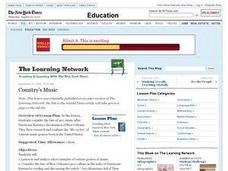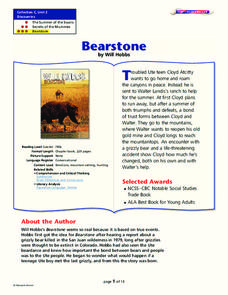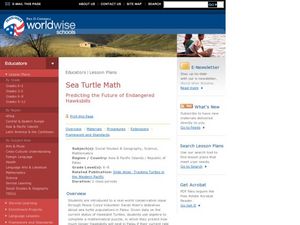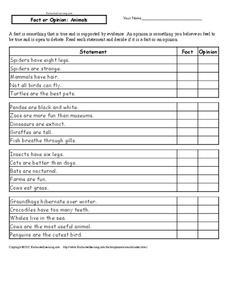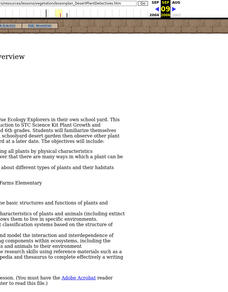Desert Discoveries
Invent - A - Saurus
Fourth graders get to invent their own dinosaur! This is done by using a very clever worksheet embedded in the plan. The worksheet leads them through naming their dinosaur by having explanations of the Latin terminology that is used with...
Curated OER
Country's Music
Jazz, Blue Grass, Hip Hop, Swing. Gospel, R&B, Ragtime, Disco. So many music genres born in the USA. After reading an article about the fate of New Orlean's Jazz after Hurricane Katrina, class members investigate the life cycles of...
Curated OER
Real Ice Ages Longer Than Movie Ice Ages
If your class's knowledge of the Ice Age is limited to animated movies, use this lesson plan to strengthen their knowledge. After sharing what they know about the Ice Age, young readers explore a news article seeking to dispel...
Curated OER
Bearstone
Use the story "Bearstone" by Will Hobbs to explore issues related to growing up. In this work, a troubled teen finds himself through an adventure in the wilderness. Learners practice summarizing, drawing inferences and conclusions, and...
Curated OER
Mountains
An informative and well-designed presentation on mountains awaits your geographers. Excellent photographs from mountain ranges around the world are includedin this terrific PowerPoint. The last slide effectively sums up what pupils have...
ARKive
Biodiversity and Evolution – Darwin’s Finches
Teens experience natural selection firsthand (or first beak) in an activity that has them act as finches foraging for food. Using different household items to act as different beak styles, your little finches will collect as much...
Curated OER
Turtle and Tortoise Preschool Lesson Plan
One of the best parts about teaching the littlest learners is that you can create thematic lessons that use one topic to address every subject. Here is a nice set of thematic teaching ideas that uses turtles and tortoises to teach...
Curated OER
The Rock and Fossil Record
Go deep in your paleontology unit with this spectacular set of slides! It introduces viewers to the types of fossils, a few famous fossils, and the geologic eras. This is done with easy-to-read text, diagrams, photos, and even videos.
College Board
Reading—Synthesis and Paired Passages
Good readers make connections between texts. The SAT regularly assesses the ability to make those connections using paired reading passages, a topic discussed in an official SAT practice lesson plan on synthesis. During the lesson plan,...
American Museum of Natural History
The Legend of the Flying Frog
Young conservation biologists have an opportunity to get involved in the effort to save endangered species. After reading and illustrating the tale of the Flying Frog, they craft a tale about another fictional endangered species.
Curated OER
Academic Raceway: Animals
Race to the finish line with this interactive PowerPoint! Students must answer multiple choice questions about animals to get to the Winners' Circle. Tip: Have students play individually until they can get all of the questions correct.
French Teacher
Changement climatique et risque de destruction des récifs coraliens
How is climate change affecting the coral reefs? Advanced French speakers read a half-page text about climate change and what it means for coral reefs. Then, following the reading, they complete a vocabulary activity and discuss the...
Education World
Every Day Edit - Whopping Crane
In this everyday editing worksheet, students correct grammatical mistakes in a short paragraph. The errors range from capitalization, punctuation, spelling, and grammar.
Curated OER
Sea Turtle Math
Students consider the future of endangered species. In this conservation lesson, students view a slide show and use mathematical data to construct a prediction for the survival of an endangered species. This lesson includes, personal...
Information is Beautiful
How Many Gigatons of Carbon Dioxide...?
Here is an interesting infographic that presents information on the amount of carbon dioxide we can safely release into the atmosphere compared to the actual amount we have released to date.
Curated OER
Fact or Opinion: Animals
How many legs do spiders have? Is that an opinion, or is it a fact? Complete a worksheet with four sets of five questions about different animals and their attributes, noting whether each statement is a fact or an opinion.
Teach Engineering
News Flash!
Extra, extra, read all about it! Scholars research information on endangered species and produce a news report to share their findings with the rest of the class. In groups, they then consider engineering solutions to problems on habitat...
American Museum of Natural History
What's This?: Early Humans
Early humans crafted shelters out of whatever materials they could find. A one-question quiz asks learners to identify the type of bones used to construct the hut pictured in a display.
Curated OER
Science NetLinks: Hollywood Dinosaurs
Middle schoolers use relevant evidence and logical reasoning to construct theories for dinosaur behavior. They examine recent evidence that challenges a prevailing dinosaur theory.
Curated OER
Desert Plant Detectives
Students examine and categorize plants in their own schoolyard desert garden and then observe other plant areas of their schoolyard.
Curated OER
Wild Where?
Students investigate why the urban environment is considered a hostile environment; define the concept of endangered species; describe and identify a Peregrine Falcon; describe and identify the eating habits of the Peregrine Falcon.
Curated OER
Fossil Kit II
Youngsters examine four fossil replicas and chart their time periods, vertebrate or invertebrate, and the names of other organisms living at the same time. A specific fossil kit is available for sale if you do not have the same samples....
Curated OER
Prairie Populations
Eleventh graders practice the Quadrat Survey Technique to analyze the biodiversity of a local plant community. They compare its biodiversity with the documented changes in biodiversity of the tallgrass prairie over time.
Curated OER
Species and Specimens: Exploring Local Biodiversity
Students practice skills essential to all scientific investigation: carefully observing and collecting data. They become field biologists in a series of hands-on activities to collect and identify specimens, and survey and calculate the...
Other popular searches
- Dinosaurs and Extinction
- Dinosaur Extinction
- Animal and Plant Extinction
- 4th Grade Extinction
- Species Extinction
- Bird Extinction
- Mammoth Extinction
- Extinction of Organisms
- Fish Extinction
- Extinction Environment
- Dinosaur Extinction Theories
- Mass Extinction Time Line



